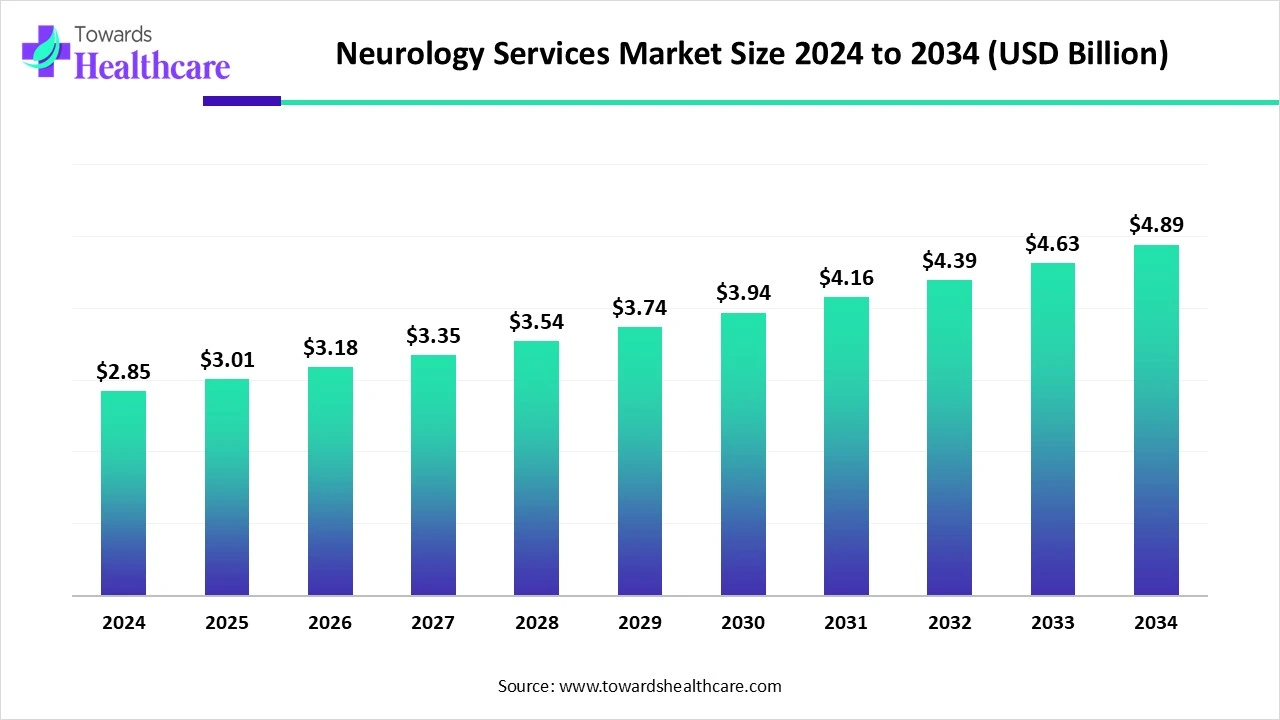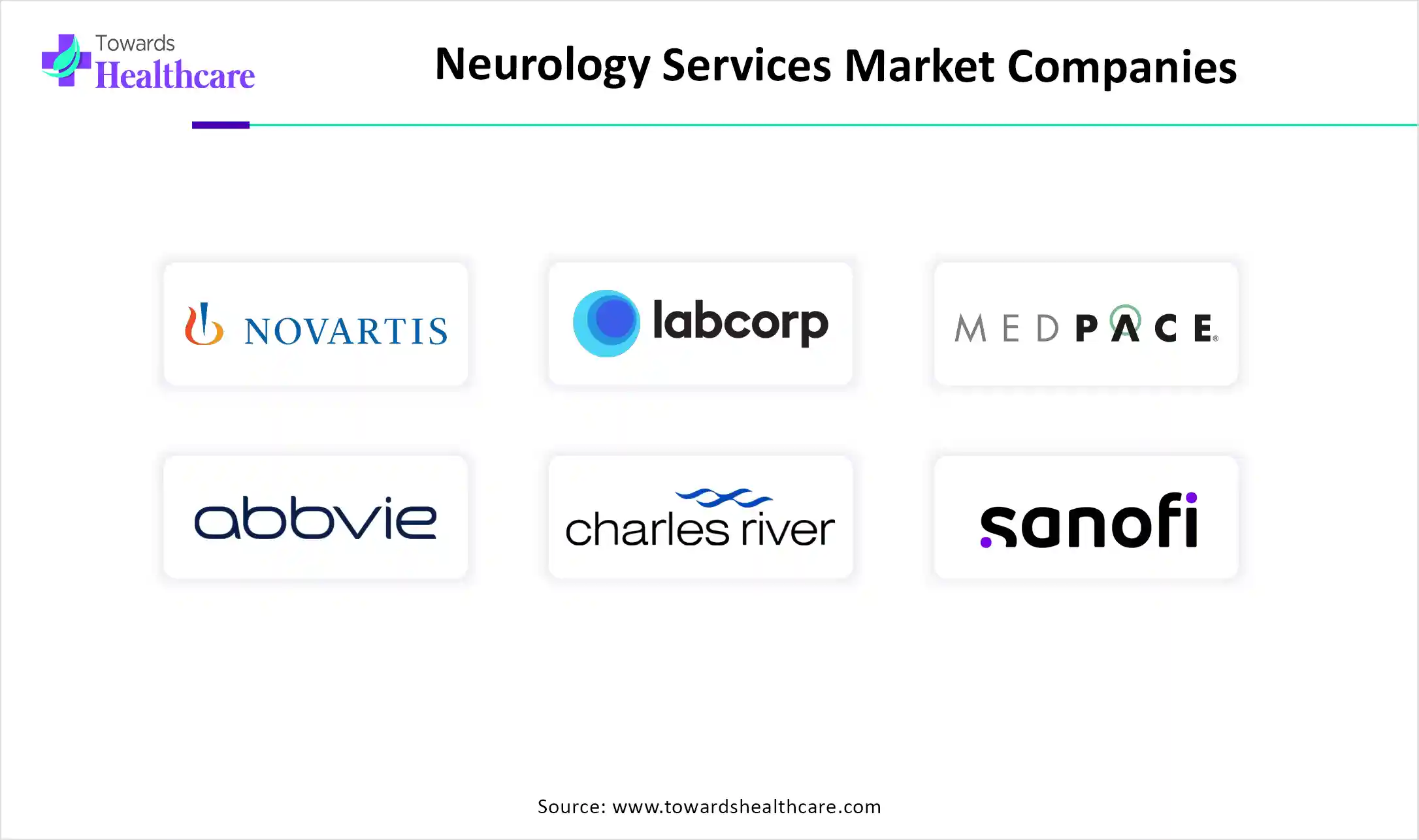January 2026

The global neurology services market size is calculated at USD 2.85 billion in 2024, grows to USD 3.01 billion in 2025, and is projected to reach around USD 4.89 billion by 2034. The market is expanding at a CAGR of 5.54% between 2025 and 2034.

| Metric | Details |
| Market Size in 2025 | USD 3.01 Billion |
| Projected Market Size in 2034 | USD 4.89 Billion |
| CAGR (2025 - 2034) | 5.54% |
| Leading Region | North America |
| Market Segmentation | By Service Type, By Indication, By Service Provider, By Regions |
| Top Key Players | Novartis, LabCorp, Medpace, Abbvie, Charles River Laboratories, Sanofi, Syneous Health, Icon Plc, GlaxoSmithKline, Aurora Healthcare, Biogen, IQVIA |
Neurology services are a type of medical service that involves the diagnosis, treatment, and management of disorders affecting the nervous system, including the brain, spinal cord, and peripheral nerves, provided by trained neurologists using clinical assessment, imaging, and therapeutic interventions. The market is evolving due to the rising prevalence of neurological disorders, especially among the aging population. Technological advancements such as deep brain stimulation and telemedicine are improving diagnosis and treatment outcomes. Additionally, the integration of digital health tools is expanding access to care and enabling remote monitoring and personalized treatments. These developments, along with growing healthcare investment, are driving market growth.
For Instance,
Artificial intelligence is significantly boosting the market by enhancing diagnostic accuracy, enabling early detection of neurological disorders, and personalizing treatment plans. AI-powered tools analyze complex brain imaging, patient data, and patterns more efficiently than traditional methods. Additionally, AI supports remote monitoring and virtual consultations, improving access to care. These advancements not only streamline clinical workflows but also lead to better patient outcomes, making AI a critical driver in the evolution of neurology services.
For Instance,
Rising Prevalence of Neurological Disorders
Diseases such as Alzheimer's, Parkinson's, epilepsy, and multiple sclerosis are becoming increasingly common due to the aging population, lifestyle factors, and improved diagnostic capabilities. These conditions often require specialized long-term medical care, increasing the demand for neurologists, diagnostic services, and advanced treatment facilities. As the number of affected individuals grows, healthcare systems are compelled to enhance and expand neurological services. This trend also encourages greater investment in research, technology, and infrastructure, further supporting the market expansion and development of more effective treatment options.
For Instance,
High-cost Treatment and Limited Access to Specialized Care
High-cost treatment and limited access to specialized care are major restraining factors as they create significant barriers for patients, especially in low- and middle-income regions. Neurological treatment often require expensive diagnostic tools, long term therapies, and highly trained specialists, making them-long term therapies, and highly trained specialists making them unaffordable or inaccessible for many. Limited availability of neurologists and specialized centers in rural or underserved areas further restricts timely diagnosis and care. These challenges reduce patient uptake of services, hinder early intervention, and ultimately slow market growth.
Adoption of Telemedicine
The adoption of telemedicine is a major opportunity for the neurology services market because it helps overcome geographical and resource barriers, allowing patients in remote or underserved areas to access specialized neurological care. Neurological conditions often require timely diagnosis and follow-up, which telemedicine enables through virtual consultations, remote monitoring, and digital health tools. This not only improves patient outcomes and convenience but also reduces the burden on healthcare facilities. As technology advances and acceptance grows, telemedicine can significantly expand the reach and efficiency of neurology services worldwide.
By service type, the therapeutic services segment dominated the market in 2024, due to growing demand for rehabilitation and non-invasive treatment options. Increasing patient preference for therapies over surgical interventions, coupled with expanding access to outpatient care, is fueling this rise. Moreover, the integration of digital therapeutics and tele-neurology services enhances treatment reach and efficiency, making therapeutic services a more accessible and sustainable option for managing neurological conditions long-term.
For Instance,
By service type, the diagnostic services segment is anticipated to grow at a substantial CAGR during the forecast period, due to the increasing prevalence of neurological disorders and the growing need for early and accurate diagnosis. Advancements in imaging technologies, such as MRI< CT scans, and PET scans, enhance the precision of neurological assessments. Additionally, rising awareness, improved access to healthcare, and integration of AI in diagnostic tools are further accelerating demand for the neurology services market.
By indication, the multiple sclerosis segment held the major market share, due to its rising global prevalence and the chronic, progressive nature of the disease, which requires continuous medical attention and long-term care. Increased awareness, early diagnosis, and advancement in disease-modifying therapies have driven demand for specialized neurology services. Additionally, ongoing research and the introduction of novel treatments have improved patient outcomes, further expanding the market growth.
By indication, the Parkinson’s disease segment is expected to grow at the fastest rate in the market during the forecast period, due to the increasing aging population, which is the most affected demographic. Advanced treatment options such as deep brain stimulation (DBS) and improved pharmacological therapies are enhancing patient outcomes and driving service demand. Additionally, growing awareness, early diagnosis, and expanding access to specialized neurological care contribute to the rapid growth of the neurology services market.
By service provider, the hospitals segment was dominant in the market in 2024 due to its comprehensive care capabilities, including diagnosis, treatment, and rehabilitation. Hospitals are equipped with advanced technologies like MRI and ECG machines, enabling accurate and efficient neurological care. The presence of multidisciplinary teams ensures holistic treatment, while the rising prevalence of neurological disorders such as stroke and Alzheimer’s further boosts market demand.
By service provider, the specialty clinics segment is projected to grow at the fastest CAGR in the market during the studied years, due to its focus on providing targeted, efficient care for specific neurological conditions. These clinics offer shorter wait times, personalized treatment plans, and access to specialists, which enhance patient satisfaction. Additionally, advancements in outpatient care, lower treatment costs compared to hospitals, and the growing demand for minimally invasive procedures are driving more patients towards specialty clinics during the forecast period.
North America dominated the neurology services market in 2024. The region's advanced healthcare infrastructure and widespread adoption of cutting-edge diagnostic technologies, such as neuroimaging and neurostimulation devices, have significantly enhanced the diagnosis and treatment of neurological disorders. Additionally, the high prevalence of conditions like Alzheimer's disease, Parkinson's disease, and stroke, particularly among the aging population, has increased the demand for specialized neurology services. Furthermore, substantial investments in research and development, along with a strong presence of leading medical device manufacturers, have contributed to the region's market leadership.
An aging population has led to a higher prevalence of neurological disorders such as Alzheimer's and Parkinson's disease. Advancements in diagnostic technologies and therapeutic interventions have improved patient outcomes, increasing demand for specialized services. Additionally, substantial investments in healthcare infrastructure and a strong presence of leading medical institutions contribute to the market's expansion. These elements collectively position the U.S. as a leader in neurology services growth.
For Instance,
The Canadian market is growing due to improved access to specialized outpatient clinics and the adoption of tele-neurology, especially in rural and underserved areas. Increased government support for neurological research and public health initiatives has enhanced early diagnosis and intervention. Additionally, a growing focus on mental health and neurodegenerative conditions has driven demand for comprehensive neurological care across the country.
Asia-Pacific is expected to grow at a significant CAGR in the neurology services market due to a rising burden of neurological disorders driven by aging populations and lifestyle changes. Rapid improvements in healthcare infrastructure, especially in countries like India and China, are expanding access to specialized care. Increased government investments, the adoption of advanced diagnostic technologies, and the growing popularity of medical tourism further support this growth. These factors collectively make Asia-Pacific a key emerging region in neurology services during the forecast period.
An aging population and lifestyle changes have led to a rise in neurological disorders, increasing demand for specialized care. Significant investments in neuroscience equipment by private entities and advancements in medical technology have enhanced diagnostic and treatment capabilities. Additionally, the growth of research and development in neurotherapies is contributing to the market's expansion. These elements collectively drive the robust growth of China's neurology services sector.
India’s market is growing due to the rise of specialized neuro-care centers and increased private sector participation in healthcare delivery. The growth of medical education and training in neurology is also creating a larger pool of skilled professionals. Moreover, public awareness campaigns and early screening programs are improving patient engagement. These developments, combined with affordable treatment options, are making neurology services more accessible and in demand across the country.
Europe is expected to see significant growth in the market due to increasing investments in innovative treatments and a strong focus on research. Improved healthcare infrastructure and growing awareness about neurological disorders are driving demand for specialized services. Additionally, supportive government policies and the rising prevalence of neurodegenerative diseases are encouraging the development of advanced therapies, making Europe a key region for neurology services during the forecast period.
For Instance,
The UK market is expanding due to several key factors. The country's robust research infrastructure, exemplified by institutions like the UCL Queen Square Institute of Neurology, fosters innovation in neurological care. Additionally, the integration of digital health solutions, including AI-driven diagnostics and telemedicine, enhances accessibility and efficiency in treatment. Government initiatives and increased healthcare investments further support the development and adoption of advanced neurology services, contributing to market growth.
For Instance,
The country is experiencing a rise in neurological disorders, including Alzheimer's, Parkinson's, and epilepsy, leading to increased demand for specialized care. Technological advancements, such as the integration of artificial intelligence and robotics in diagnostics and treatment, are enhancing the precision and efficiency of neurological services. Additionally, Germany's strong healthcare infrastructure and favorable reimbursement policies support the growth of this sector.

In July 2024, the WHO just put out a new toolkit to help countries follow the Intersectoral Global Action Plan on epilepsy and neurological disorders by 2031. Neurological conditions cause a lot of disability worldwide, but many people, especially in poorer countries, don’t get the care they need and often face discrimination. Dévora Kestel, WHO’s mental health director, said making IGAP work will take a team effort from everyone involved. (Source - World Health Orgnization)
By Service Type
By Indication
By Service Provider
By Regions
January 2026
January 2026
January 2026
January 2026